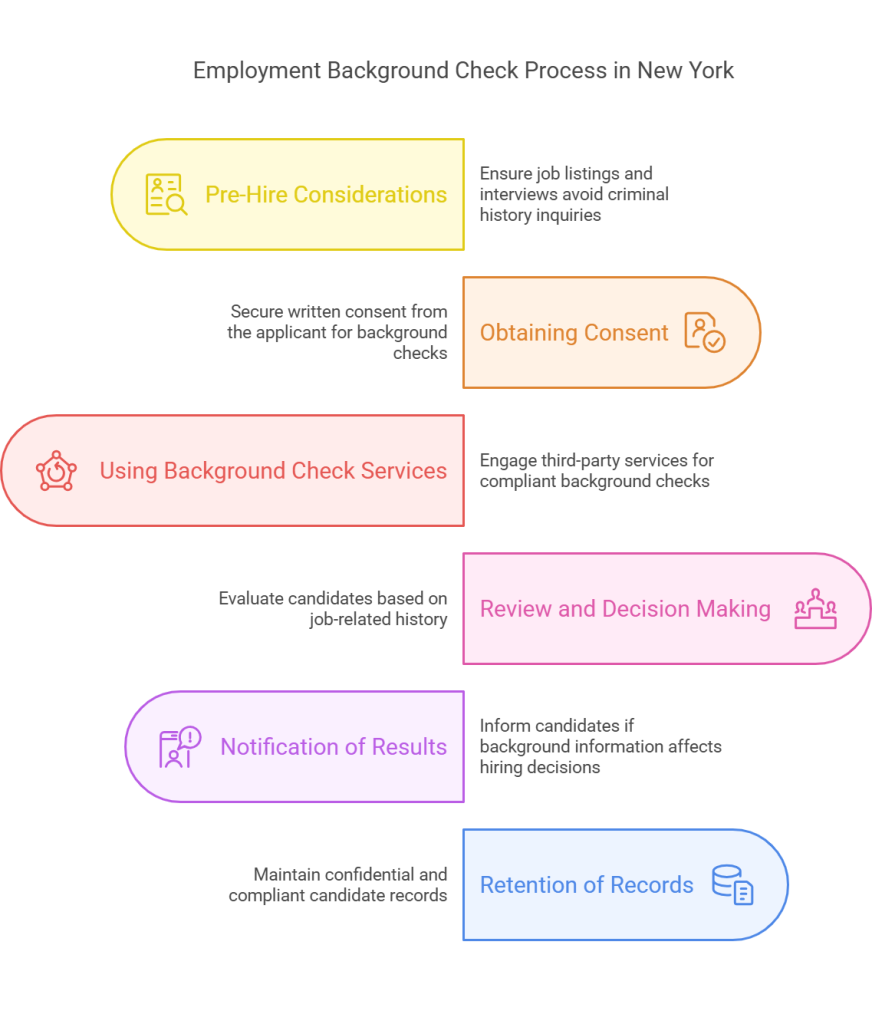Employment in New York comes with its own set of background check laws and guidelines, especially important for both employers and job seekers to understand. These checks are pivotal in ensuring that a candidate is the right fit for a role, while also protecting the company from potential risks. Here, we provide a comprehensive guide to navigating these requirements effectively, ensuring compliance and transparency at every step.
Key Takeaways
- The Fair Credit Reporting Act requires employers to get written consent from job seekers before conducting background checks.
- New York's Human Rights Law protects individuals with criminal records from being unfairly excluded during the hiring process.
- The Fair Chance Act in New York City mandates that employers wait until after making a conditional job offer before inquiring about a candidate's criminal history.
- Job seekers must be notified of background checks, have the right to dispute inaccuracies in their reports, and know that their criminal history isn't the sole ground for rejection.
- Employers and candidates should understand these regulations to ensure a fair hiring process and protect candidate rights.
What Are Employment Background Checks?
In straightforward terms, employment background checks are all about fact-checking what candidates claim about themselves. When a company considers hiring someone, they might want to peek at a few key areas: past jobs, criminal records, credit history, and other bits of personal history. This is not just about digging up dirt; it’s about making sure there’s truth in the resume and the candidate fits the bill for the role.
In New York, this checking process has a safety net of rules. Companies can't just snoop around without consent—there’s a playbook they need to follow. They have to be clear with candidates about what they’re checking and why, ensuring no corners are cut. This keeps things above board and respects the privacy of individuals while helping businesses avoid any unexpected surprises.
EXPERT INSIGHT: As an HR Leader, I know balancing business growth with employee career development can be tricky. But having clear processes in place makes it easier. It all starts with clear and concise policies and processes. Background checks are no exception. They can be challenging, but fair and well-written policies ensure transparency and preparedness for everyone involved. Read on to see a guide to Employment Background Check Laws & Requirements in New York. - Emile Garcia, SHRM-SCP, CHRP, CHRBP
Data and Statistics
Employment background checks are an integral part of the hiring process. Statistics reveal that over 90% of U.S. employers engage in these checks for prospective employees. This high prevalence underscores their role in shaping job markets and highlights the need for thorough understanding of associated laws and procedures.
In terms of hiring outcomes, data indicates that nearly one-third of employers have rescinded job offers based on background check results. This demonstrates the significant impact that these findings can have on employment prospects and the critical importance of ensuring both compliance and accuracy in conducting these checks.
For job seekers, it's vital to understand how frequently these checks occur and the weight they can carry in hiring decisions. Avoiding potential pitfalls by reviewing your own background information for inaccuracies can be crucial. With proper awareness, both employers and candidates can manage this process more effectively, minimizing risks and maximizing fair opportunities.
Key Legislation Governing Background Checks
Background checks in New York are guided by several key pieces of legislation that set the groundwork for what employers can and cannot do during the hiring process.
Fair Credit Reporting Act (FCRA)
This federal law lays out the basics for using consumer information in the hiring process. Employers need written permission from candidates before running a background check. If an employer decides not to hire someone based on the background check, they must inform the candidate and provide details on how to dispute the report.
New York State Human Rights Law
Aimed at ensuring fairness, this law protects individuals from being unfairly discriminated against due to their criminal past. It emphasizes evaluating a candidate based on their merits and current circumstances, rather than solely on past convictions.
Ban the Box Law (Fair Chance Act)
Specific to New York City, this law changes the timing of when criminal history can be discussed, allowing applicants to be judged first on their qualifications without the initial stigma of a criminal record. Employers can only ask about criminal histories after making a conditional job offer, giving everyone a fairer shot at employment.
Understanding these laws is crucial for both employers and job seekers. Employers need to construct their hiring process around these rules to avoid legal pitfalls, while candidates should feel empowered knowing their rights are protected by these regulations.
Conducting Employment Background Checks in New York
The Process
Conducting a background check in New York involves a few crucial steps to ensure both legality and fairness. Here's how you can do it:
- Pre-Hire Considerations: Before touching on the subject of background checks, make sure your job listings and interviews steer clear of any inquiries into an applicant's criminal past. This aligns with the Ban the Box Law, which forbids certain questions until a conditional offer is on the table.
- Obtaining Consent: Before diving into someone's background, you need their permission. The Fair Credit Reporting Act mandates that you receive written consent from the applicant first. It’s not just a courtesy; it’s the law.
- Using Background Check Services: It makes sense to bring in third-party services to do the heavy lifting. These services are usually up-to-date on compliance and can offer options tailored to your needs.
- Review and Decision Making: Once you have the background info, use it wisely. Evaluate candidates based on how their history relates to the job, not based on biases that have no place in the hiring process.
Post-Check Protocols
- Notification of Results: If background information impacts your hiring choice, New York law says you need to clue the candidate in and allow them a chance to dispute potential errors.
- Retention of Records: Keep candidate information confidential and make sure your record-keeping aligns with New York state guidelines on retention laws.

Doing this right not only keeps you within the bounds of the law but also builds trust with future employees. It shows that you’re committed to fairness and respect throughout the hiring process.
Frequently Asked Questions (FAQs)
Will I Be Informed If a Background Check Is Being Conducted In New York?
Yes, you will be notified. Employers can't just dive into your history without your knowledge. Federal law requires them to inform you and get your explicit consent before they start poking around in your background.
How Can My Criminal Record Affect My Job Prospects In New York?
Your criminal record isn't a deal-breaker at first. Thanks to the Fair Chance Act, your criminal history is considered only after a conditional job offer. Employers must be fair and can't reject you solely based on past convictions due to the Human Rights Law.
What If There Is an Error in My Background Check Report In New York?
Errors happen, but they don't need to ruin your prospects. If your report has inaccuracies, you have the right to dispute them. The Fair Credit Reporting Act outlines steps to correct errors, ensuring you can clear up any mistakes. This way, inaccuracies won't cost you a job opportunity.
Conclusion
Navigating the intricacies of background checks can be easier for both employers and candidates with the right resources. Employers may benefit from third-party services that specialize in background screening. These services often provide tailor-made packages aligned with legal standards, reducing compliance burdens.
For job seekers, several online platforms offer access to personal background reports. This proactive approach helps candidates understand what potential employers might find. Knowing your report ahead of time allows you to address discrepancies and prepare explanations for any issues during the hiring process.
Both parties can seek guidance from legal experts or employment consultants familiar with New York's requirements. Whether it's a one-time check or ongoing support, these resources ensure that the background check process remains transparent, efficient, and fair. Compliance, transparency, and respect for applicant privacy are crucial when navigating New York's employment background check laws.
Employers must understand the legal landscape to conduct fair and lawful evaluations effectively. Meanwhile, job seekers should be aware of their rights and the processes involved. These ensure they are both prepared and protected in their job search. With this knowledge, both parties can engage in a hiring process that is efficient and fair to everyone involved.
Additional Resources:
- Pre-Employment Screening in New York: A Comprehensive Guide
- Understanding Background Check Processes in New York

GCheck Editorial Team
Meet the GCheck Editorial Team, your trusted source for insightful and up-to-date information in the world of employment background checks. Committed to delivering the latest trends, best practices, and industry insights, our team is dedicated to keeping you informed.
With a passion for ensuring accuracy, compliance, and efficiency in background screening, we are your go-to experts in the field. Stay tuned for our comprehensive articles, guides, and analysis, designed to empower businesses and individuals with the knowledge they need to make informed decisions.
At GCheck, we're here to guide you through the complexities of background checks, every step of the way.






